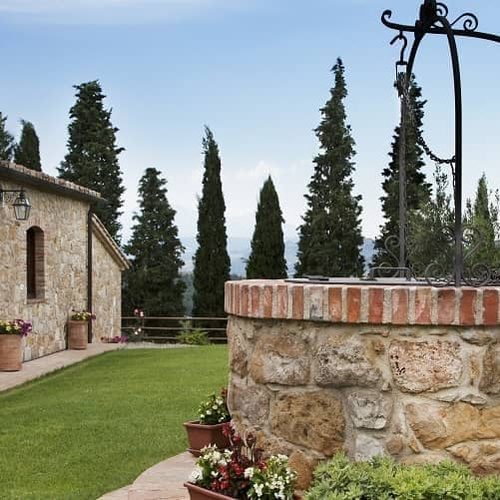Buying a house with a septic tank: Pros and cons
Mar 11, 2024
•6-minute read
When you’re moving from the city or suburbs out to a little piece of land, there are many things you dream of. Perhaps you want to live on a homestead or just need more quiet and space? Maybe you’re thinking of all the stars you’ll see or all the neighbors you won’t have to deal with?
Whatever you’re dreaming about when looking for a home in a more rural area, chances are those dreams don’t include buying a house with a septic tank. Let’s discuss the pros and cons of septic tanks and some considerations you should make before going ahead with the purchase.
What is a septic tank?
A septic tank gathers wastewater – waste generated by your toilet and bathroom, garbage disposal and washing machine – from your house and holds it underneath the yard. Solids remain in the tank while liquids exit into a buried drain field.
Since the solids sink to the bottom, septic tanks need to be routinely emptied and maintained to avoid potential system failures.
Here are the primary terms you should become familiar with when talking about a septic tank:
- Inspection ports: Inspection ports or pipes allow cameras, tools and small glances inside the tank to make sure everything is functioning appropriately.
- Manhole: This is the top port on the septic tank. Someone can climb into the manhole if necessary.
- Scum: Scum is the oil or grease that floats on top of the wastewater. Special compartments and the outlet prevent the scum from leaving the tank with the wastewater.
- Effluent or wastewater: The effluent, also called wastewater, is the liquid waste that leaves the tank.
- Sludge: Sludge is the solid waste that sinks and settles on the bottom of the tank.
- Drain field or leach field: The drain field, or leach field, is where the effluent flows to outside the tank. It’s basically a section of unsaturated soil outside the tank where the soil filters out the harmful bacteria.
Now that you understand a little about how they work you may feel less intimidated by the prospect of owning a home that uses a septic tank. However, if you’re considering buying a piece of real estate with this type of system, you may want to submit a contingent offer pending a septic inspection. Most homeowners with a septic system will likely understand this requirement and won’t refuse. Especially if you have an initial approval from your lender that demonstrates you're a serious buyer who's ready to close if the inspections come up clean.
Tips for buying a house with a septic tank
Here are some of the most important considerations you should make before buying a house with a septic tank.
Learn your local laws
Septic systems are built to match your home for local code. These local laws may have rules around septic tank inspection, maintenance and replacement. Some state and local health departments require a septic tank inspection before you can transfer the title. They may also require you to put in a larger septic tank if you decide to expand and add plumbing.
Get the system inspected
Septic systems need to be regularly inspected and maintained to avoid problems. Inspectors can perform a sewer scope inspection as well as check for pipe integrity, proper ventilation and drainage. They will look for leaking or clogging and try to spot potential problems before they become bigger ones.
Inspections should happen every 3 years but a lot of people forgo these inspections. If you’re buying a home with a septic tank, you should ask to see its inspection history. Reviewing these reports will alert you to any previous system issues, like tree roots blocking pipes or clogged filters.
Know the specs of your system
You need to have some idea of the specifications of the septic tank. The size will determine how frequently it needs to be drained. You also need to know when it was installed, as septic tanks may need to be replaced every 20 – 40 years. To have your tank replaced costs $3,000 – $10,000 on average, depending on the size of the tank and where your home is located.
Prepare for regular maintenance
A septic tank needs to be regularly inspected, maintained and drained to avoid issues. Typically, you’ll need to have the sludge pumped out of it and disposed of every few years. On average, this can cost you $300 – $600, depending on the size of the tank.
You might also want to use biological additives. These can help increase the number of microbes in the tank, such as the bacteria and enzymes that will break down the sludge and scum. Using additives could increase the amount of time between tank cleanings.
Be careful what you put down the drain
A lot of things shouldn’t go down the drain, whether you’re on a septic system or municipal sewer line. The difference is, if you put something down the drain that doesn’t belong, and you’re on a septic system, it’s your problem.
Hygiene products, paint, grease and oil, hair, dental floss, paper towels or cat litter can all cause clogs and prevent drainage. These clogs can result in leaky pipes and sewage flowing back into your home. Make sure the products you flush, like toilet paper and wipes, are safe for septic tanks and will break down over time. Even bleach can be harmful because it kills the friendly microbes that break down sludge. Be mindful of what you put down the drain, so it doesn’t cause you a much larger problem.
Know what can go wrong
Some things can go wrong with septic systems, especially if they’re not maintained. Leaks, ruptured and clogged pipes, and a flooded drain field can result in a big mess. For instance, if your yard floods and there isn’t enough weight in the septic tank, it can cause the tank to move or float, breaking the pipe.
If there’s too much liquid in the tank or drain field, the tank may not drain quickly enough – or at all. This can cause backflow problems if you’re using a lot of water regularly through things like running a dishwasher, washing machine or taking showers and baths.
Recognize signs of a potential problem
You need to know how to spot a possible issue before it becomes a real one. Things like unusual odors, odd plumbing sounds, slow drainage and backflow into your drains are all signs you need your septic tank inspected.
What are the pros and cons of owning a house with a septic tank?
While buying a home with a septic tank can feel complicated, there are still some advantages to using this type of system. Here are some of the main pros and cons of having a septic tank.
Pros of having a septic tank
As a homeowner, you can enjoy these benefits of using a septic system:
- You can save money by not having to pay for public sewer.
- When properly maintained, septic systems are more environmentally friendly.
- Septic tanks allow you to live further away from cities.
- Septic tanks can last up to 40 years.
- Having a septic tank can save money on property taxes, since your property isn’t hooked up to a municipal sewer.
Cons of having a septic tank
Unfortunately, you might also experience these drawbacks when using a septic tank:
- Maintenance costs $300 – $600 every few years (which can still be cheaper than municipal sewer costs, depending on where you live).
- It can cause groundwater contamination if the system leaks. This can be a problem for well water.
- If not maintained, you can have a costly mess on your hands.
- Septic tanks will eventually need to be replaced.
- Putting the wrong thing down the drain becomes your problem.
Septic tank FAQs
If you’re still unsure about buying a home with a septic system, learn more about them by reading these common questions.
Should I buy a house with a septic tank?
Septic systems are a part of living in a rural area. If you want to be away from the bustling city, they’re something you’re probably going to have to deal with. In the long run, they may save you money on your taxes and utilities.Is it bad to buy a house with a septic tank?
Septic tanks were first used in the United States in the early 1860s. That means this technology has been around for a substantial amount of time. So, if you find your dream home and it happens to have a septic system, you shouldn’t walk away from it.What are the maintenance costs of a septic system?
The annual maintenance costs for a septic tank are typically minimal, except for years when you need an inspection, or the sludge needs to be pumped out. In that case, you can expect to pay between $300 and $600.
What are the pros of buying a house with a septic tank?
Having a home with a septic tank can not only save you money but, properly maintained, septic tanks can be more environmentally friendly. Owning a home with a septic system allows you to live further from cities and septic tanks can last up to 40 years.What are the cons of buying a home with a septic tank?
Septic tanks can be costly with maintenance costs between $300 - $600 every few years. If not maintained, it can be costly to fix and eventually septic tanks will need to be replaced.The bottom line: You don’t need to avoid homes with septic systems
Septic systems are the reality of living in a more rural area. If you want a place where you’re away from the crowds and noise of a city, chances are it will come with a septic system. Don’t fret. Inspections and maintenance every few years can keep your septic safe and worry-free.
When buying a home with a septic tank, ask for inspection records and be aware that there may be local laws/ordinances regarding septic systems. A septic inspection should be part of the general home inspection you need before purchasing the property.
If you haven’t done so already, we encourage you to start the mortgage approval process before looking at other properties or putting in an offer on your current favorite. Making an offer without an approval letter in hand can often lead to rejection, as the seller could be less confident that you can secure financing.

Carla Ayers
Carla Ayers is former section editor for Rocket Homes and is a Realtor® with a background in commercial and residential property management, leasing and arts management. She has a Bachelors in Arts Marketing and Masters in Integrated Marketing & Communications from Eastern Michigan University.
Related resources
9-minute read
Selling a house as is: What to know
Learn what it means to sell your house as is, the pros and cons, and how to attract serious buyers without making costly repairs.
Read more
7-minute read
Where should I live? 12 important factors to consider
From small towns to big cities, there's a perfect place for everyone. We’ve collected 12 factors to help you answer the question, “Where should I...
Read more

8-minute read
Buying a house with well water: How well water works and the pros and cons
Considering buying a house on well water? Before you do, read the pros and cons about houses with well water, and our tips for maintaining your water’s...
Read more